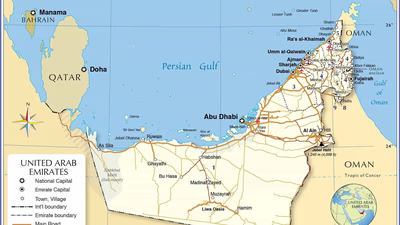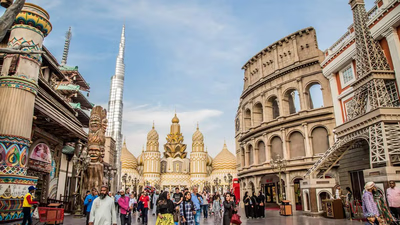
Dubai"s trade platform enhances commodity exports and imports. "
It is one of the thousands of features of Dubai that has made this region one of the largest commercial destinations in the world, especially for Iran. The presence of these salient features has led to the city of Dubai being introduced today as the most important international trade route in the Middle East. The construction and existence of various ports along with a multitude of modern airports has provided the necessary conditions and facilities for the export and import of goods from around the world to this point.
The availability of such facilities in Dubai made exports and imports to the country's terminals both faster and more economical than in other countries. These important advantages caused us to continue to study exports to Dubai by dinghy, fruit exports to Dubai, saffron exports to Dubai, pickles exports to Dubai, the best goods to export to Dubai, exports to Dubai in Nuts field, exports to Dubai in the field of handicrafts, exports to Dubai in the field of aloe vera and saffron luggage trade to Dubai and export company to Dubai. For more information in this regard, you can follow us to the end of the article.
In fact, exports to Dubai are done in two ways, either by air or by sea. Which is generally the marine method using the dinghy. One of the most common and oldest methods of export to Dubai is the export of goods by lanyard, which is also called telangiege export. In fact, the export of all kinds of goods by dinghy in the Persian Gulf has long been common among Iranian traders, and even today this method for many reasons such as the restrictions that some ports have in mooring or the evacuation of large vessels or the speed that The launches are still going on and many Iranian and Emirati traders are moving their goods this way.
It should be noted that containers cannot be transported by lanyard, so they must be packed to move and export goods. For this reason, non-container ports generally use dinghies for export to Dubai. One of the most important advantages of exporting to Dubai with a lanyard is that the volume of export goods is not large, so they can provide the best service. Also, since these bars do not have container and port affairs, they do not have high tariffs. Another important advantage of this method is its very low cost and cost-effectiveness compared to other methods.
These important advantages led most traders to export their goods to Dubai in this way, and then use containers to ship in Dubai, where they carry out port and customs affairs related to shipments. Of course, it should be noted that because the lanyard is an old and traditional device, goods are usually exported to Dubai with the lanyard that are not sensitive and are not damaged when exposed to water, such as saffron or nuts or handicrafts and from Such cases.
It is true that Dubai is known as an economic power and promise in the world, but the agricultural industry is not so strong and this issue has left the hand of trade, especially Iranian traders, to export agricultural products, especially fruit to Dubai. Dubai, like other countries in the Persian Gulf, has a small variety of agricultural products due to climatic conditions and hot and humid, and the only prosperous agricultural product is dates. Of course, this product is also very low due to the lack of arable land in Dubai. Because Dubai is a very small country and this issue caused it to supply about 80% of its summer crops and agricultural products from Iran and Turkey.
The booming Dubai trade market has made the Dubai fruit market a profitable market for our country. Today, exports to Dubai in the field of fruit has become one of the most important non-oil exports of our country, so that this export in a certain period of time, is one of the most profitable and lucrative exports of Iran. Currently, among the countries of the Persian Gulf, Dubai has the largest amount of domestic fruit exports. Exports to Dubai for fruit are generally made across water borders. Watermelon and tomato are the most important fruits exported to this country.
-

The United Arab Emirates (UAE) is a federation of seven emirates located in the Middle East, known for its significant oil reserves and economic diversification efforts. The country has transformed into a global business hub, with Dubai recognized for its tourism and architectural marvels. Abu Dhabi, the capital, features cultural landmarks like the Sheikh Zayed Grand Mosque. The UAE"s economy is bolstered by sectors such as finance, real estate, and renewable energy, attracting international companies due to its transparency and security. The multicultural society comprises both Emiratis and expatriates, with Arabic as the official language and English widely spoken in business contexts. The UAE"s strategic geographical location enhances its role in regional trade, making it a vital player in West Asia"s import-export activities. Hosting major events like Dubai Expo 2020 and international sports competitions further solidifies its status as a trade advertising platform. Understanding the UAE"s unique characteristics is essential for businesses looking to engage in commodity trade or supply chain solutions within the region.
-

The UAE"s economy has historically depended on oil and gas revenues, but significant efforts have been made to diversify into sectors like tourism, finance, and technology. The government aims to create a sustainable economy by reducing reliance on petroleum exports. Dubai stands out as a regional financial center with a robust logistics network that enhances global trade connectivity. Despite diversification, oil still plays a crucial role in the economy, particularly in Abu Dhabi. The UAE ranks among the top exporters and importers globally, with strong trade ties to countries like China and India. The tourism sector has become a major non-oil income source, supported by luxury hotels and extensive development projects. The UAE actively seeks foreign investment through favorable policies and free zones that offer tax exemptions and 100% foreign ownership. This openness has fostered an environment conducive to international business growth, making the UAE a key player in global trade. "
-

The UAE has established comprehensive laws and regulations for imports and exports to facilitate trade while ensuring public health and safety. Customs duties vary based on product type, origin, and trade agreements, necessitating consultation with the Federal Customs Authority for accurate tariff rates. The UAE adheres to international sanctions, requiring compliance from all traders. Free zones offer benefits like 100% foreign ownership and tax exemptions, but regulations differ across emirates. Businesses must secure valid commercial licenses and register with the UAE Customs Office to operate. The country has a high import rate, primarily in precious metals and machinery, with specific tariffs on goods like alcohol (50%) and tobacco (100%). The UAE"s efficient trade processes make it one of the easiest countries for import-export activities in the region. Compliance with health standards is crucial for food and agricultural imports, often requiring certifications or inspections.
Intellectual property laws are robust, necessitating respect for trademarks and copyrights in trade activities. Importers must also navigate documentation requirements for customs clearance, including invoices and permits. "
-

Dubai has emerged as a pivotal international trade hub in the Middle East, particularly for Iranian traders. Its strategic location, coupled with advanced port and airport facilities, facilitates efficient import and export operations. The city is known for its diverse export activities, including agricultural products like fruits and nuts, as well as handicrafts. Exports to Dubai can be conducted via air or sea, with the latter often utilizing traditional dinghy methods due to their cost-effectiveness and speed. This method is particularly favored for non-sensitive goods that can withstand exposure to water. Despite Dubai"s economic strength, its agricultural sector is limited, leading to a reliance on imports for most summer crops from countries like Iran and Turkey. The fruit market in Dubai has become especially lucrative for Iranian exporters, with watermelon and tomatoes being among the top exported items. Overall, the trade dynamics in Dubai highlight its role as a vital B2B marketplace in West Asia. "
-

The UAE"s population exceeds 9 million, with Emiratis constituting a small fraction. The majority are expatriates drawn from diverse regions, including South Asia, the Middle East, and Western countries. This demographic diversity is fueled by the UAE"s status as a global business hub, offering numerous job opportunities in sectors like construction, finance, and healthcare. The government provides Emirati citizens with social welfare benefits and public sector employment opportunities. The population dynamics are influenced by government policies aimed at balancing the native Emirati population with the expatriate workforce. As a result, the UAE ranks fifth globally in terms of being immigrant-friendly. The country is geographically located in the Middle East and consists of seven emirates: Abu Dhabi, Dubai, Sharjah, Ajman, Umm Al Quwain, Ras Al Khaimah, and Fujairah. Each emirate has unique characteristics that contribute to the overall economic landscape of the UAE. With ongoing changes in global conditions and local policies, the demographic composition of the UAE is expected to evolve further.
-

Abu Dhabi, the capital of the UAE, is the largest emirate and serves as the political and cultural hub. Known for its stunning architecture, it features landmarks like the Sheikh Zayed Grand Mosque and Emirates Palace. Dubai, the most populous city, is a global business center famous for its luxurious lifestyle and iconic structures such as Burj Khalifa. Other emirates like Ras Al Khaimah offer outdoor activities with mountainous landscapes, while Fujairah is popular for diving due to its rich marine life. Each emirate contributes uniquely to the UAE"s economic landscape, showcasing a blend of modernity and tradition. The UAE"s diverse cities enhance its appeal as a trade platform in West Asia, attracting both importers and exporters.






